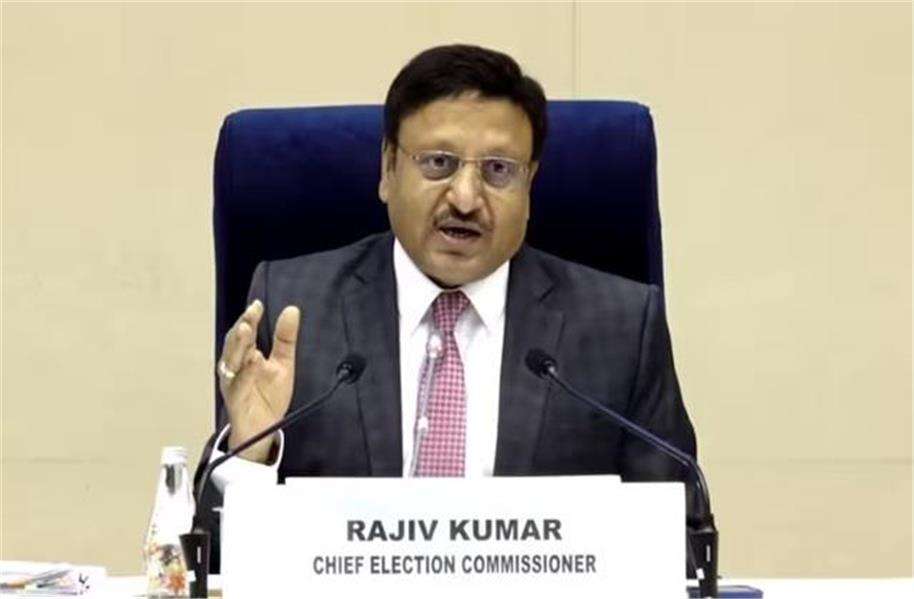
New Delhi. The Election Commission of India announced the dates for the assembly elections today (Friday). Elections will be held in Jammu and Kashmir in three phases. The first phase of voting will be held on September 18, the second phase on September 25 and the last phase on October 1, while the counting will take place on October 4.
The Election Commission has also announced the dates for the 90 seats of Haryana Assembly. Voting will be held in a single phase for all 90 seats of Haryana. Voting will be held on all 90 seats on October 1 and the election results will be declared after counting of votes on October 4. Chief Election Commissioner Rajiv Kumar said that there are 90 assembly constituencies in Jammu and Kashmir, in which 74 are general, 9ST, and 7 SC reserved seats. There are a total of 87.09 lakh voters, of which 44.46 lakh are men, 44.62 lakh are women and 169 are transgenders. The voters include 82,590 Divyaangjan, 73,943 senior citizens, 2,660 centenarians and 76,092 service voters. He said, there are 3.71 lakh first time voters.
He further said that the people of Jammu and Kashmir want to change the picture. Everyone is excited for the elections. The team had also visited Jammu and Kashmir and Haryana. We were waiting for the weather to improve.
Let us tell you that elections have not been held in Jammu and Kashmir since the dissolution of the government in 2018. The last time assembly elections were held here was in 2014, in which the BJP and the People’s Democratic Party (PDP) had formed an alliance. However, the BJP later distanced itself from this alliance, and the government fell in 2018.
The term of the current government in Haryana ends in November. The last elections were held in 2019, when the BJP and the Jannayak Janata Party (JJP) formed the government together. The alliance between the two parties broke in March this year. After today’s press conference, the dates announced by the Election Commission will give political parties and voters an idea of the plan for upcoming electoral activities.
Assembly elections in Jammu and Kashmir after 10 years
Assembly elections are going to be held in Jammu and Kashmir after a gap of 10 years. Before this, the last assembly elections were held in 2014. During this time, many important changes have taken place in the politics of Jammu and Kashmir.
2014 Election Results:
Of the 87 seats in Jammu and Kashmir in the 2014 assembly elections:
The PDP (People’s Democratic Party) won 28 seats.
The BJP (Bharatiya Janata Party) got 25 seats.
The National Conference won 15 seats.
The Congress won 12 seats.
Based on these election results, the BJP and PDP formed the government together, and Mufti Mohammad Sayeed was made the Chief Minister.
Code of conduct implemented
The Model Code of Conduct (MCC) in India is a document issued by the Election Commission for political parties and candidates during the election process. Its purpose is to make the electoral process free, fair and transparent. It is mandatory for all political parties, candidates and the government to follow this code of conduct.
Rules for political parties and candidates
1. Speech and rhetoric: Political parties and candidates must avoid personal criticism and comment on the private life of any individual. Seeking votes on the basis of religion, caste, language, or community is also prohibited.
2. Distribution of money and gifts: No money, gifts, liquor, or other items can be distributed to influence voters.
3. Campaigning activities: No religious places, government buildings, or educational institutions can be used while campaigning.
4. Campaigning near polling stations: On the day of voting and 48 hours before, any kind of campaigning is prohibited within 100 meters of polling stations.
5. False promises: Promises that are impractical or impossible should not be made.
Rules for the government and government officials
1. After the announcement of the election dates, the government cannot announce any new scheme, project, or policy that could influence voters.
2. No government official can be transferred or promoted during the election period, unless permission is taken from the Election Commission.
3. The use of government vehicles, officials, and other resources for election campaigning is prohibited.
4. Any kind of government propaganda on government advertisements or media that could influence the election is prohibited.
Legal implications of violation of the code of conduct:
1. Violation of the election code of conduct can lead to criminal cases under various sections of the Indian Penal Code (IPC).
2. The Election Commission can take action against violators, which may include warning, filing an FIR, or cancelling a candidate’s nomination.
3. Any election-related violation can be sued in court, which may affect the candidate’s election eligibility.





